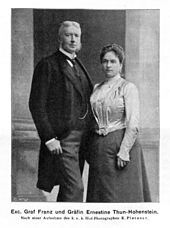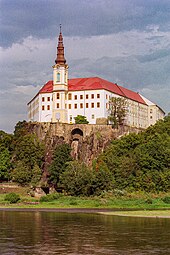Franz von Thun and Hohenstein (politician)
Franz Graf von Thun and Hohenstein , since 1911 Prince of Thun (born September 2, 1847 in Tetschen , Bohemia ; † November 1, 1916 there ) was an Austrian politician, long-time governor of Bohemia and briefly Prime Minister of Cisleithanien , the Austrian half of the Habsburg Empire .
Life
family

Franz was the second child from the marriage of Friedrich von Thun and Hohenstein (1810–1881) and Leopoldine, née Countess von Lamberg (1825–1902). He studied law at the University of Vienna . After completing his studies, Thun joined the army as a one-year volunteer and was assigned to the "Fürst zu Windisch-Graetz" No. 14 dragoon regiment . Then the reserve released, he took over the following years several times as orderly officer at the high command of Archduke Albrecht on maneuvers in part. By the end of October 1891, Thun was promoted to major in the reserve.
On May 18, 1874, he married Anna Maria Wilhelmine Leopoldine Eugenie Princess zu Schwarzenberg (* 1854) in Prague , who died childless on December 24, 1898. On January 21, 1901, he married Ernestine Gabriele Countess von Thun and Hohenstein in Prague, widowed Countess Wratislaw von Mitrowitz (1858–1948). From this marriage comes his daughter Anna Maria, married Thienen-Adlerflycht (1903–1943).
politics
Thun had been a member of the Vienna Reichsrat since 1879 as a representative of the association of conservative landowners . In 1881 he followed his father as a member of the manor house . From 1883 to 1889 and 1901 to 1911 he was also represented in the Bohemian state parliament.
On March 5, 1889 he was appointed governor of Bohemia and charged with the formation of a new government, the main task of which was to bring about reconciliation between the German and the Czech population. However, this met with resistance from German-Bohemian politicians in the state parliament. He stood out as a patient promoter of a policy of understanding in the settlement negotiations with the Czechs. Later he met the resistance of the strengthened Young Czechs ( Národní strana svobodomyslná ), who advocated the idea of national rebirth . Violence broke out in Prague in 1893, the state parliament was closed and Thun declared a state of emergency for the city on September 12, 1893 . The fight against the opposition, including the trial against the anarchist secret society Omladina in 1894 , remained ineffective. Renewed arguments eventually led to his resignation in 1896. The assumption of government by Kasimir Felix Badeni as Prime Minister, who was supported by the Young Czechs, also contributed to this. In that year, at the request of the emperor, he became the court master of the heir apparent, Franz Ferdinand . The employment relationship lasted only a few months because of mutual dislike.
From March 7, 1898 to October 2, 1899 Thun kk was Prime Minister and Minister of the Interior of the kingdoms and states represented in the Imperial Council. Again, the Bohemian language dispute was at the center of his politics. With his principles for a legal regulation of the language question valid for Bohemia and Moravia he tried in vain to achieve a legal regulation. His reign was marked by the continued obstruction of the German national parties against the Baden language ordinance in the plenum of the Reichsrat .
From 1911 on, Thun was once again governor in Bohemia. At the beginning of his second term of office as governor of Bohemia, he was elevated to the rank of prince by Emperor Franz Joseph I on July 19, 1911. The army leadership under Archduke Friedrich and Conrad von Hötzendorf exerted great pressure on Prince Thun because they wanted a military government under a general in Bohemia, but Emperor Franz Joseph and his Prime Minister Karl Stürgkh stood behind the Bohemian governor and his politics. When Thun fell ill with a detached retina in March 1915 and his general health deteriorated considerably, he resigned from his position as governor of the Kingdom of Bohemia at the end of March 1915. On the occasion of his farewell, Emperor Franz Joseph awarded him the diamonds for the Grand Cross of the Order of St. Stephen .
On November 1, 1916, he died at his castle in Tetschen on the Elbe and was buried in his major's uniform.
literature
- Jan Galandauer: Franz Prince Thun. Governor of the Kingdom of Bohemia. Böhlau, Vienna 2014, ISBN 978-3-205-78820-1 (Czech original version, Prague 2007).
- Alfred Ableitinger: Badeni - Thun - Clary-Aldringen - Eulenburg. The Austrian system of government in the crisis of 1897–1899. In: Gernot Peter Obersteiner (Ed.): Festschrift Gerhard Pferschy for his 70th birthday. Histor. Provincial Commission for Styria, Graz 2000, ISBN 3-901251-15-4 , pp. 327-349.
- Ursula Naschold: Franz Graf von Thun and Hohenstein and the time of his ministerial presidency (1898−99). Unprinted dissertation, Vienna 1959.
- Brigitte Svatos: Prince Franz von Thun and Hohenstein and the situation in Bohemia at the beginning of the First World War. With special consideration of the nationality question. Unprinted dissertation, Vienna 1972.
- HP Hye: Thun and Hohenstein Franz Fürst von. In: Austrian Biographical Lexicon 1815–1950 (ÖBL). Volume 14, Verlag der Österreichischen Akademie der Wissenschaften, Vienna 2012–, ISBN 978-3-7001-7312-0 , p. 322 f. (Direct links on p. 322 , p. 323 ).
Web links
- Franz Prince of Thun and Hohenstein †. In: Wiener Zeitung , November 2, 1916, p. 7 (online at ANNO ).
- Entry on Franz von Thun and Hohenstein (politicians) in the Austria Forum (in the AEIOU Austria Lexicon )
Individual evidence
- ^ A b Ernst Rutkowski: Letters and documents on the history of the Austro-Hungarian monarchy. Volume 1: The Constitutionally Loyal Large Estate 1900–1904. Oldenbourg, Munich 1991, ISBN 3-486-52611-1 , p. 38.
- ↑ Hans Lemberg: Public life in the Bohemian lands before the First World War. In: Ferdinand Seibt (Ed.): The chance of understanding. Intentions and approaches to supranational cooperation in the Bohemian countries 1848–1918. Oldenbourg, Munich 1987, ISBN 3-486-53971-X , pp. 175-186, here: p. 179.
- ^ Ernst Rutkowski: Letters and documents on the history of the Austro-Hungarian monarchy . Volume 1: The Constitutionally Loyal Large Estate 1900-1904. Oldenbourg, Munich 1991, ISBN 3-486-52611-1 , pp. 77 and 244.
- ^ Helmut Slapnicka: The powerlessness of parliamentarism. In: Ferdinand Seibt (Ed.): The chance of understanding. Intentions and approaches to supranational cooperation in the Bohemian countries 1848-1918. Verlag Oldenbourg, Munich 1987, ISBN 3-486-53971-X , pp. 147-174, here: p. 161.
- ↑ Austrian Parliament
- ^ Jan Galandauer: Franz Prince Thun. Governor of the Kingdom of Bohemia. Böhlau, Vienna 2014, ISBN 978-3-205-78820-1 , p. 24.
| personal data | |
|---|---|
| SURNAME | Thun and Hohenstein, Franz von |
| ALTERNATIVE NAMES | Thun and Hohenstein, Count Franz Anton von; Thun and Hohenstein, Franz de Paula Graf |
| BRIEF DESCRIPTION | Bohemian-Austrian politician |
| DATE OF BIRTH | September 2, 1847 |
| PLACE OF BIRTH | Tetschen |
| DATE OF DEATH | November 1, 1916 |
| Place of death | Tetschen |



